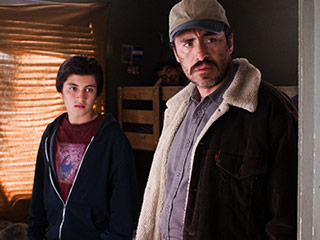An Illegal American, by Jack Fleischer
Some of director/writer/producer Chris Weitz’s movies are hollow and under developed (Down to Earth, Antz). Others are small and complex gems (About a Boy). Yet, most of his films tend to be hopeful, sweet and emotionally satisfying. A Better Life holds tight to the second two points. It’s a light hopeful tale, with a release perfectly timed for pop-pride-day.
This time Weitz’s subject matter involves the illegal Hispanic population living and working in Los Angeles. Carlos Galindo (Demian Bichir of “Weeds” and Che) is a single father trying to raise his son on the straight and narrow all while working hard to bring about the film’s title. He’s a Mexican illegal, and his stateside born son is the only remnant of the now dissolved marriage that brought him stateside. Played with stunning aplomb by Bichir, his Galindo rides the line between being a man beaten down, and a father who is still holding on to a hell of a lot of hope.
The movie begins straightforwardly enough by tracing out the grinding life that comes with being an undocumented worker. The path seems predictable, perhaps even formulaic: a man struggles to work outside the system and keep his son out of trouble. Either he’ll beat the odds, or they’ll beat him.
Yet, the film takes a great turn in a very simple scene that manages to wrench out both high hope and deep tension all within the context of yard work.
From that moment on, the movie becomes less about the difficulty of undocumented life, and instead becomes a piece about a father and son who live together, and yet are separated by their separate and distinct cultures. It’s no longer a story about political divisions so much as personal ones.
It’s the second half of this film that makes it a success. What starts as a character study transforms into a mystery both literally and metaphorically. The tension unspools at a steady rate, with highs and lows coming in rapid succession, and much of the credit for this goes to the cast.
I can’t say enough great things about Bichir’s performance. I knew him from “Weeds” – but now I understand that I need to see more of his work. Galindo’s son, played by newcomer José Julián, also does a bang-up job as a boy who has never taken the time to understand why his father is the person he is.
This film is simple and fulfilling, even if it doesn’t end on the highest of notes (or does it?). It’s also educational. The three things I take away from this film are, a.) I don’t work nearly hard enough, b.) There is a truly amazing Mexican subculture in Los Angeles that is deeper and richer than I ever understood, and c.) I need to call my dad.



























